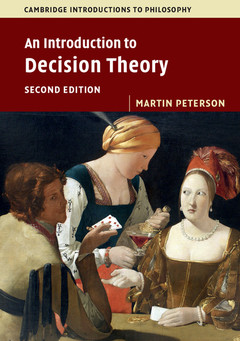Description
An Introduction to Decision Theory (2nd Ed., Revised edition)
Cambridge Introductions to Philosophy Series
Author: Peterson Martin
A comprehensive and accessible introduction to all aspects of decision theory, now with new and updated discussions and over 140 exercises.
Language: English
Subject for An Introduction to Decision Theory:
Publication date: 03-2017
348 p. · 17.4x24.9 cm · Paperback
348 p. · 17.4x24.9 cm · Paperback
Description
/li>Contents
/li>Biography
/li>
Now revised and updated, this introduction to decision theory is both accessible and comprehensive, covering topics including decision making under ignorance and risk, the foundations of utility theory, the debate over subjective and objective probability, Bayesianism, causal decision theory, game theory, and social choice theory. No mathematical skills are assumed, with all concepts and results explained in non-technical and intuitive as well as more formal ways. There are now over 140 exercises with solutions, along with a glossary of key terms and concepts. This second edition includes a new chapter on risk aversion as well as updated discussions of numerous central ideas, including Newcomb's problem, prisoner's dilemmas, and Arrow's impossibility theorem. The book will appeal particularly to philosophy students but also to readers in a range of disciplines, from computer science and psychology to economics and political science.
Preface; 1. Introduction; 2. The decision matrix; 3. Decisions under ignorance; 4. Decisions under risk; 5. Utility; 6. The mathematics of probability; 7. The philosophy of probability; 8. Bayesianism and pragmatic arguments; 9. Causal vs evidential decision theory; 10. Risk aversion; 11. Game theory I: basic concepts and zero-sum games; 12. Game theory II: nonzero-sum and cooperative games; 13. Social choice theory; 14. Overview of descriptive decision theory; Appendix A. Glossary; Further reading; Index.
Martin Peterson holds the Sue and Harry Bovay Chair in the Department of Philosophy, Texas A&M University. He is the author of several books on decision theory, ethics, and risk, including Non-Bayesian Decision Theory (2008), The Dimensions of Consequentialism (Cambridge, 2013), and The Ethics of Technology (forthcoming).
© 2024 LAVOISIER S.A.S.




